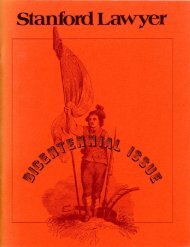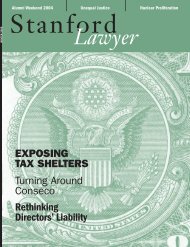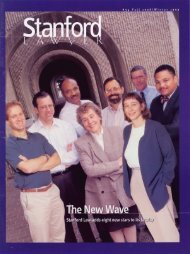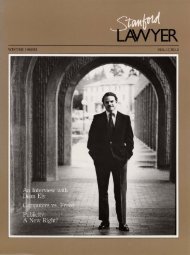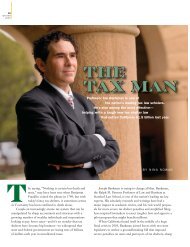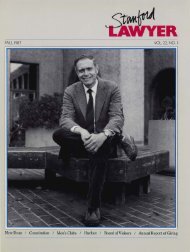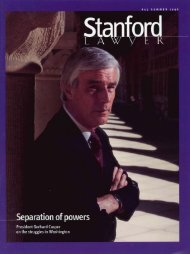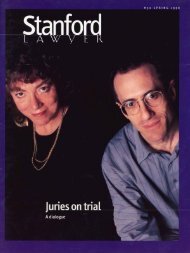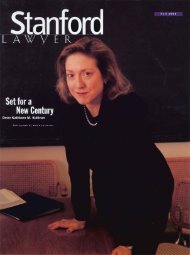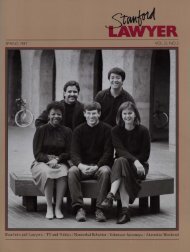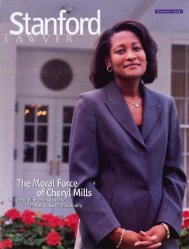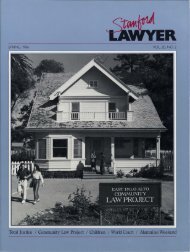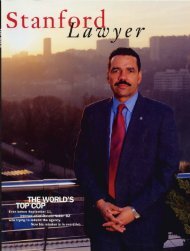CAREER 'ALTERNATIVES' (cant.)2. A suggestion made at those meetings was thatthe faculty somehow idealizes for the students thelife of the large-firm corporate lawyer. If you thinkabout it you will soon recognize that that claim is atleast exaggerated, given that those of us on thefaculty obviously have chosen a different life. Well,then, students sometimes continue, the faculty is insufficientlyopen about its own moral values, and byits silence implicitly endorses the common corporatelaw career path as the only one worth considering.Actually, most of us do think it's a path worth considering,given that most graduates of <strong>Stanford</strong> andother law schools follow it and most, though not all,report satisfaction with their choice. But the only oneworth thinking about? Certainly we don't think that,and I suspect that what must be happening is thatas teachers we are very skittish about even suggestinghow we think you should spend your lives. Weare not spiritual advisers or preachers, and I certainlyhave no inclination to suggest to the faculty thatthat is what they should become.It is the case, however, that in addition to theacademic life which we now share, a large numberof the members of our faculty and staff have bothpast professional and present advisory affiliationswith various sorts of government agencies and other"public interest"-type organizations. (Some alsohave backgrounds in business law, of course; manyhave the sort of "mixed" background that often getsoverlooked in discussions like this but may in fact bethe most satisfying of all.) I think you will find ushappy to discuss our experiences - not all of whichhave been unequivocably favorable (or we wouldn'tbe here) - should you come to us with questions.To this end, I am attaching to this memorandum alist prepared and distributed by our PlacementOffice last month, entitled "<strong>Stanford</strong> Law SchoolFaculty/Staff Public Interest/Public Service Background."[Interested readers may obtain a copy ofthis list from the Placement Office, (415) 497-3925.]Again, no one is trying to steer you anywhere, butdo be aware that there are resources here to helpacquaint you with the range of alternatives.3. Students sometimes assert that during their firstterm courses, the discussions are conducted andthe hypothetical cases are set so as to assume acorporate law firm environment. As I think aboutsubjects taught in the first term, I have some troubleimagining how this can be so. In any event, I am bythis memorandum requesting the Curriculum Committeeto consider working into the first week of thefirst term - the Introduction to Law and Legal Institutionsprogram - instruction on the wide rangeof careers and activities that are open to those withlegal training. Again, we are not trying to steer anybody,but rather to be neutral, in this case to ac-quaint our students at the outset with the fact thatindeed there is legal life beyond the corporate lawfirm, and that life in such firms can itself be craftedso as to incorporate a rich and satisfying mix.4. Finally, and perhaps most tangibly, I am instituting- out of the Richard E. Lang Dean's DiscretionaryAccount and with the earmarked assistanceof other interested donors - a three-year experimentalloan program, whereby up to ten studentsper summer working in law-related jobs for governmentagencies or tax-exempt non-profit organizationswill be able to borrow up to $3500 ($2000for summer living expenses and $1500 to satisfy thestudent's expected contribution to school year expensesfrom summer earnings). Interest will be at 9percent, which we anticipate will be near the marketinterest rate when the money is lent. It will beginaccruing immediately, but the first payment will notbe due until six months after graduation. For the firsttwo years after graduation, only interest will be due.In the third, fourth, and fifth years after graduation,the borrowers shall pay one-third of the outstandingprincipal as well as accrued interest. (It should beclear that we are not hereby providing a financial incentivefor summer employment in a non-large-firmsetting. One whose principal considerations regardingsummer employment are financial would bequite ill-advised to take advantage of this program.The point instead is to help remove an existing disincentive,growing out of the need to put oneselfthrough school, to students' using one of their twosummers as a way of gaining exposure to some"alternative" form of law practice.)Obviously such a loan will have the effect of placingthe student involved, perhaps already significantlyin debt, into further debt. That is why seriousrepayment obligations are not incurred until threeyears after graduation, at which point most graduateswill be quite gainfully employed. To remove thepossible disincentive to the post-graduate acceptanceof low-paying, "alternative" employment whichthe program might, paradoxically, create, we haveincorporated the provision that the principal paymentsshall be forgiven if, at the time any principalpayment is due - that is, in the third, fourth, or fifthyear after graduation - the student is earning lessthan $27,500 (as adjusted for changes in the consumerprice index). To be eligible for loan forgiveness,the former student must be working full time ina law-related job. (Again, the financial inducementshere are plainly too small to draw anyone into"alternative" work because of the money. That is notour intention. Instead, by this forgiveness provisionwe have tried to remove the possibility that the student,by borrowing money in order to sample somethingdifferent during one of his or her summers, willhave created an additional financial disincentive tofurther pursuit of such "alternative" work.)54<strong>Stanford</strong> <strong>Lawyer</strong> <strong>Fall</strong> <strong>1983</strong>
Class of <strong>1983</strong>ReceivesDiplomas andHonorsDiplomas were presentedto 158 membersof the Class of <strong>1983</strong> inan awards ceremonyheld June 12 in KresgeAuditorium.John Hart Ely, dean ofthe Law School, welcomedthe School's 90thgraduating class andover 650 of their relativesand friends.Class PresidentStephane Atencio presentedthe <strong>1983</strong> JohnBingham Hurlbut awardfor excellence in teachingto Professor PaulGoldstein (see interviewon next page).Many members of thegraduating class wererecognized for outstandingachievements duringthei r th ree years at theLaw School.Bernard A. Burk wasnamed the NathanAbbott Scholar, for thehighest cumulativegrade-point average inthe class. The Urban A.Sontheimer prize forsecond highest averagewent to Michael J. Klarman.Sixteen members ofthe class were elected tothe Order of the Coif:Bernard A. Burk, DavidL. Furth, Samuel M. Hurwitz,William G. Roche,Michael J. Klarman, KirkM. Veis, Cynthia McGawMoore, Mark B. Seidenfeld,Dana L. Gross,David J. Shaffer, VincentM. Waldman, John D.Guinasso, Robert B.Hawk, John S. Gordon,CAREER 'ALTERNATIVES' (cant.)I am appointing as a Committee to administer theloan program Deans McBride and Smith, secondyearstudents Sharon Gwatkin and Michael Zigler,with Professor Mnookin as chair. The last three personsnamed were instrumental in designing the loanprogram, as was second-year student CatherinePagano, who has escaped Committee duties by takingan Externship this spring. Further details on theprogram are available from members of the Committee.During the summer of <strong>1983</strong>, eleven students tookadvantage of the new loan program to obtain experiencein public service and/or government settings:Tracey Altman (1 st year student), office of theDistrict Attorney, New York County,' Xavier Becerra(2d) and Steven Goldfarb (1 st), Mexican AmericanLegal Defense and Educational Fund, San Francisco,'Patricia Chang (1 st), Office of the Public Defender,San Francisco,' Doran Goldman (1 st), DistrictAttorney, Manhattan,' Kirby Heller (1 st) and SaraLipscomb (2d), Public Advocates, Inc., San Francisco,'Ellen Kessler (1 st), Department of the AttorneyGeneral, Boston,' Laura Loeb (2d), Alaska Legal ServicesCorporation,' Carole Cooke (1 st), U.S. Departmentof Justice, Sacramento,' and Sandy Ortiz (2d),National Center for Immigrants' Rights, Los Angeles.•Thomas M. Hagler, andRobert A. Olson.The Frank BakerBelcher award for thebest academic work inevidence was won byDavid I. Schiller.Margaret A. Niles receivedthe Carl MasonFranklin Prize for the outstandingpaper in internationallaw.Eva Marie Carney andMichael J. Gennaco receivedthe <strong>1983</strong> FaerieMallory Engle Prize,awarded to the finalistsof the School's ClientCounseling Competition.The <strong>1983</strong> Olaus andAdolph Murie award forthe most thoughtful wriJtenwork in environmen'tal law went to Palma J.Strand. The 1982 awardhad also been won by amember of the class,J. Christopher Grace.<strong>Stanford</strong> Law Reviewawards went to SharonL. Reich for outstandingeditorial contributions,Margaret A. Niles forbest student note, andDan Gunther '83 with Katherine Rose '07Cynthia M. Moore foroutstanding service tothe Review.The R. Hunter SummersTrial PracticeAward, given by officersof Serjeants at Law forstudent performances intrials conducted duringthe year, went to RobertM. Bohl, Joseph E.Bringman, John S. Gordon,James A. Henderson,Samuel M. Hurwitz,Dennis P. McLaughlinand Gail MacQuesten.The Nathan BurkanMemorial Competitionprize, law school division,was awarded toHenry V. Barry for thebest paper on copyrightlaw.A string quartet playedwhile graduates andtheir families celebratedat a reception held inCrocker Garden followingthe ceremony.[Readers may enjoythe photographs of thefestivities featured in theAnnual Report section ofthis issue. - Ed.] •<strong>Fall</strong> <strong>1983</strong> <strong>Stanford</strong> <strong>Lawyer</strong> 55
- Page 1 and 2:
RFAll 1983VOL. 18, NO.1Heroin Optio
- Page 3 and 4:
jah(e,oYCONTENTSSTANFORD lAWYEREdit
- Page 5 and 6: Business Law vs. Public Interest La
- Page 7 and 8: By John Kaplanjockson Eli ReynoldsP
- Page 9 and 10: maintenance almost entirely up toth
- Page 11: smaller percentage of British addic
- Page 14 and 15: that, because of regulation, cannot
- Page 16 and 17: of a whole variety of new mortgagei
- Page 18 and 19: ConversationsWith Five AlumniBy Mic
- Page 20 and 21: y landlords and tenants about rents
- Page 22 and 23: when I was studying law and she was
- Page 24 and 25: ~o(1)AtISSUE *Union 'Rights' in the
- Page 26 and 27: AtISSUECongressional Responses toSu
- Page 28 and 29: AtISSUEPrison Labor:TimeTo Take Ano
- Page 30 and 31: Graduates and friends of theSchool
- Page 32 and 33: ~o~ 4'-VVcYi~STATE OF THE SCHOOLJoh
- Page 34 and 35: ~o~ Cff-VIMtu'0r-STATE OF THE SCHOO
- Page 36 and 37: ~o~ 4-(/141~STATE OF THE SCHOOL con
- Page 38 and 39: ~o~4VJ41~SUCCESSFUL LAWYERING:IMPLI
- Page 40 and 41: ~o~of-VJM~SUCCESSFUL LAWYERING cont
- Page 42 and 43: @.oarcA 4l!141~THE CONSTITUTION, RA
- Page 44 and 45: @o~4t1J41~.LAW AND BUSINESS PROGRAM
- Page 46 and 47: @otwrA 4vJ41~ .SUMMARY AND ADVISORY
- Page 48 and 49: David L. Engel(Harvard, JD '73)Bost
- Page 50 and 51: New Faculty (cont.)Michigan Law Sch
- Page 52 and 53: GILSON (cant.)Gilson is currently p
- Page 54 and 55: BabcockAwarded anHonorary LL.D.by S
- Page 58 and 59: Hurlbut WinnerTalks AboutTeachingPr
- Page 60 and 61: Schod;NI Grads Scatter toCities All
- Page 62 and 63: FACULTV NOTES (cant.) Professor Gun
- Page 64 and 65: it will be less so if we adopt a he
- Page 66 and 67: than on its edges, thus increasing
- Page 68 and 69: Heroin maintenance is, in manyways,
- Page 70 and 71: c~OTESII1912-25Hon. David Lee Rosen
- Page 72 and 73: c~NOTESthe firm advises, that "Donn
- Page 74 and 75: c~NOTESand had been prominent in a
- Page 76 and 77: spring Dean Ely traveledLEast, wher
- Page 78 and 79: 5Stanford LaWlers:This Page IsYours
- Page 80 and 81: October 11Washington, DC LawSociety
- Page 82 and 83: COMPARATIVE CONTRIBUTIONS TOTHE LAW
- Page 84 and 85: A MESSAGE FROM THELAW FUND PRESIDEN
- Page 86 and 87: CLASSAGENTSLong BeachSterling S. Cl
- Page 88 and 89: Warren Christopher'49 Penny Howe Ga
- Page 90 and 91: Frank L. Mallory '47Richard C. Mall
- Page 92 and 93: Ronald G. Trayner '67Anthony J. Tre
- Page 94 and 95: Walter A. Johnson, A.B. '29 Maxine
- Page 96 and 97: DONORS TO THE LAW FUND• Hon. Murr
- Page 98 and 99: CLASS OF 1948R. Winfield AchorHon.
- Page 100 and 101: • Thomas R. MitchellR. Chandler M
- Page 102 and 103: Paul E. Kreutz• Prof. Richard B.
- Page 104 and 105: Gabriel M. GesmerMichael GilfixCorn
- Page 106 and 107:
HIGHEST LEVELSOF PARTICIPATIONLARGE
- Page 108 and 109:
FACULTY, FORMERFACULTY &STAFFBarbar
- Page 110 and 111:
REUNION GIVINGWhile class reunions
- Page 112 and 113:
DONORS TO SPECIALPROGRAMS AND FUNDS
- Page 114 and 115:
Class of 1954 Reunion Student Finan
- Page 116 and 117:
In Memory of:Clifton C. Cottrell '2
- Page 118 and 119:
Clyde E. Tritt'49William W. VaughnS
- Page 120:
BEQUESTS AND DEFERRED GIVINGBequest




